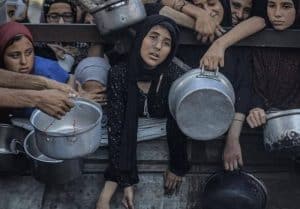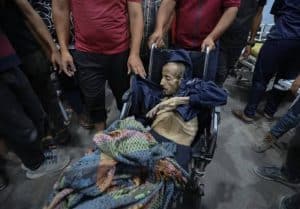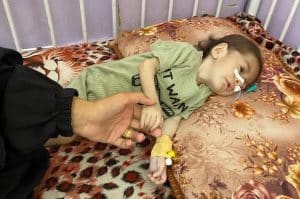PNN – While the famine and hunger disaster in Gaza has reached an indescribable level, the people of this strip say that hunger has turned people’s faces upside down and that we sometimes do not even recognize the faces of our loved ones, but despite this, we will not give up our resistance and stay in our land.
According to the report of Pakistan News Network, amid the rubble of houses and famine and hunger in the northern Gaza Strip, the humanitarian disaster in the city of Beit Hanoun, where thousands of families are living under the burden of hunger, continues to deepen; children in particular are facing the risk of gradual death due to the lack of food, medicine, and basic necessities of life.
Filling empty stomachs with water
Maher Nasim, a displaced person in Beit Hanoun, told Al Jazeera, The suffering of children in Gaza has reached unbearable levels due to the inability of families to provide food and even water.
He added: Adults are often forced to drink water to relieve hunger pangs and to survive. We are not even able to explain what is happening to our children, and they cannot find anything to satisfy their hunger.
This Palestinian refugee in the northern Gaza Strip stated: My children’s mental state has deteriorated sharply and they are starting to ask painful questions that indicate their despair about life.

Hassan Abu Shughaiba, the head of a household who has lost his source of income, also said: My family has been forced to eat foods that are not normally edible. My children have eaten horse meat and some days we have survived on salt only because we cannot find any food and one of my children is severely disabled and not only medicine but also food is not available for him.
He continued: The situation in Gaza is catastrophic in every respect, and the occupying enemy is responsible for bringing the people to this stage of famine and deprivation as a result of the continuous cruel siege and military attacks on infrastructure and humanitarian centers.
Resistance on empty stomachs
Abu Azzawidi, another displaced Palestinian citizen in Beit Hanoun, also said: Hunger has completely changed the faces of people here, and we cannot even recognize the faces of our loved ones. The severity of the suffering has taken its psychological and physical toll on everyone, and many people have lost the ability to distinguish between day and night amid displacement and constant hunger.

He stated: Beit Hanoun has become a symbol of hunger and human collapse in Gaza, but despite this, the people remain steadfast and steadfast, and consider their continued presence in Gaza a form of resistance, even if it comes at the cost of facing hunger, disease, and death.
The bitter story of infants dying of hunger
Nourhan Saleha, a 20-year-old woman from Gaza who has a 6-month-old baby and has been constantly displaced from place to place since the birth of her daughter, Hayat, said: We decided to name my daughter Hayat so that we could find some light and hope for life amidst this darkness, despair, death, destruction, and famine; but the reality is complex and beyond our simple dreams and wishes.

The 20-year-old Palestinian mother emphasized: During the months of pregnancy until Hayat’s birth, I was constantly in anxiety, hunger, displacement, homelessness, and witnessing scenes of death and destruction. These bad feelings and experiences during Hayat’s fetal period affected him and caused him to be born with a weak immune system and severe infection, and doctors placed him in an incubator for 25 days.
He added: Hayat was born weighing 3 kilograms, but instead of gaining weight, she started losing it, and how can we really expect her to gain weight when I myself am suffering from starvation and cannot breastfeed her?
Dr. Khalil al-Daqran, spokesman for al-Aqsa Martyrs Hospital in the center of the Gaza Strip, announced in a press statement that the bed occupancy rate in the pediatric ward is estimated at 250 percent due to the severe overcrowding of children in hospitals who are facing severe malnutrition and other infectious diseases resulting from the consequences of the famine.

